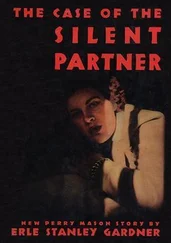Jonathan Kellerman - Silent Partner
Здесь есть возможность читать онлайн «Jonathan Kellerman - Silent Partner» весь текст электронной книги совершенно бесплатно (целиком полную версию без сокращений). В некоторых случаях можно слушать аудио, скачать через торрент в формате fb2 и присутствует краткое содержание. Жанр: Триллер, на английском языке. Описание произведения, (предисловие) а так же отзывы посетителей доступны на портале библиотеки ЛибКат.
- Название:Silent Partner
- Автор:
- Жанр:
- Год:неизвестен
- ISBN:нет данных
- Рейтинг книги:5 / 5. Голосов: 1
-
Избранное:Добавить в избранное
- Отзывы:
-
Ваша оценка:
- 100
- 1
- 2
- 3
- 4
- 5
Silent Partner: краткое содержание, описание и аннотация
Предлагаем к чтению аннотацию, описание, краткое содержание или предисловие (зависит от того, что написал сам автор книги «Silent Partner»). Если вы не нашли необходимую информацию о книге — напишите в комментариях, мы постараемся отыскать её.
Silent Partner — читать онлайн бесплатно полную книгу (весь текст) целиком
Ниже представлен текст книги, разбитый по страницам. Система сохранения места последней прочитанной страницы, позволяет с удобством читать онлайн бесплатно книгу «Silent Partner», без необходимости каждый раз заново искать на чём Вы остановились. Поставьте закладку, и сможете в любой момент перейти на страницу, на которой закончили чтение.
Интервал:
Закладка:
Sharon began hypnotic treatment. Not surprisingly, J. was an excellent subject- hypnosis itself is a dissociation. The results were dramatic, almost immediate.
J. was indeed suffering from multiple personality syndrome. Under trance, two identities emerged: J. and Jana- identical twins, precise physical replicas of each other but psychological polar opposites.
The “J.” persona was well-mannered, well-groomed, a high achiever, though tending toward passivity. She cared about other people and, despite the unexplained absences due to fugue, managed to perform excellently in a “people-oriented profession.” She had an “old-fashioned” view of sex and romance- believed in true love, marriage, and family, absolute fidelity- but admitted to being sexually active with a man she’d cared deeply about. That relationship had ended, however, because of intrusion by her alter ego.
“Jana” was as blatant as J. was reticent. She favored tinted wigs, revealing clothing, and heavy makeup. Saw nothing wrong with “tooting dope, popping the occasional downer,” and liked to drink… strawberry daiquiris. She boasted of being a “live-for-today bitch, queen of the hop-to, a total Juicy Lucy wrapped up in a fucking Town and Country ribbon, which makes what’s inside all the more hot.” She enjoyed promiscuous sex, recounted a party during which she’d taken Quaaludes and had intercourse with ten men, consecutively, in one night. Men, she laughed, were weak, primitive apes, governed by their lusts. A “sexy snatch is everything. With one of these , I can get as many of those as I want.”
Neither “twin” acknowledged the other’s existence. Sharon regarded their existence as a pitched battle for the patient’s ego. And despite Jana’s flair for drama, it was the mannerly J. who appeared to be winning.
J. occupied about 95 percent of the patient’s consciousness, served as her public identity, carried her name. But the 5 percent claimed by Jana was the root of the patient’s problems.
Jana stepped in, Sharon theorized, during periods of high stress, when the patient’s defense system was weak. The fugues were brief periods of actually “being” Jana. Doing things that J. couldn’t reconcile with her self-image as a “perfect lady.”
Gradually, under hypnosis, Jana reappeared more and more, and eventually began describing what had happened during the “lost hours.”
The fugues were preceded by a pressing drive for complete physical escape, an almost sensual pressure to bolt. Impulsive travel soon followed: The patient would put on a wig, get in her “party clothes,” jump in her car, get onto the nearest freeway, and drive aimlessly, often for hundreds of miles, without itinerary, “not even listening to music, just the sound of my own hot blood pumping.”
Sometimes the car “took” her to the airport, where she used a credit card to book a flight at random. Other times she stayed on the road. In either case, the jaunts usually ended in debauchery: an excursion to San Francisco that climaxed with a three-day orgy of “meth sniffing and righteous group gropes with a bunch of Angels in Golden Gate Park.” Pill-eating in a Manhattan disco, followed by skin-popping heroin in a South Bronx shooting gallery. Orgies in various European cities, assignations with derelicts and “head-case street pickups.”
And a “righteous skin groove.” Making a pornographic movie “somewhere out in Florida. Fucking and sucking like a superstar.”
The “parties” always ended in drug-induced blackout during which Jana retreated and J. woke up, oblivious to everything her “twin” had done.
This ability to split was the crux of the patient’s problem, Sharon decided, and she targeted it for therapeutic assault. J.’s ego had to be integrated, the “twins” drawn closer and closer, eventually confronting each other, reaching some sort of rapprochement, and merging into one fully functioning identity.
A potentially traumatic process, she acknowledged, unsupported by much clinical data. Very few therapists claimed to have actually integrated multiple personalities, so the prognosis for change was poor. But Kruse encouraged her, supporting her theory that, since these multiples were identical “twins,” they shared a “psychic core” and would be amenable to fusion.
During hypnosis she began introducing J. to small bites of Jana: brief glimpses of drives down a highway, a signpost or hotel room that Jana had mentioned. Camera-shutter exposures of neutral material that could be easily withdrawn if the patient’s anxiety rose too high.
J. tolerated this well- no outward signs of anxiety, though she didn’t respond to any of the Jana material and disobeyed Sharon’s post-hypnotic suggestion that she recall these details. The following session was identical: no memory, no response at all. Sharon tried again. Nothing. Session after session. Blank wall. Despite the patient’s previous suggestibility, she was completely noncompliant. Determined, apparently, that the “twins” would never meet.
Surprised at the strength of the patient’s resistance, Sharon wondered if she’d been wrong about twinship making integration easier. Perhaps just the opposite was true: The fact that J. and Jana were physically identical, but psychological mirror opposites, had intensified their rivalry.
She began researching the psychology of twins, especially identicals, consulted Kruse, then took another tack: continuing to hypnotize the patient but backing away from attempts at integration. Instead, she adopted a more chummy role, simply chatting with the patient about seemingly innocuous topics: female siblings, twins, identicals. Leading J. through dispassionate discussions- was there really a special bond between twins, and if so, what was its nature? What was the best way to raise twins as children? How much of the behavioral similarity between identicals was due to heredity, how much to genetics?
“Riding with the resistance,” she termed it. Taking careful note of the patient’s body language and speech tones, synchronizing her own movements with them.
Exploiting the hidden message, in accordance with Dr. P. P. Kruse’s theory of communication dynamics.
This went on for several more months; at a casual glance, nothing more than two friends gabbing. But the patient responded to the shift in strategy by slipping deeper than ever into hypnosis. Showing such profound suggestibility that she developed total skin anesthesia to a lit match, eventually adjusting her breathing to the cadence of Sharon’s speech. Appearing ready for direct suggestion. But Sharon never offered one, just kept on chatting.
Then, during the fifty-fourth session, the patient slipped spontaneously into the Jana role and began describing a wild night that had taken place in Italy- a party at a private villa in Venice, peopled by weird, grinning characters and fed by flowing booze, abundant dope.
At first just another Jana orgy tale, every prurient detail recounted with relish. Then, halfway into the story, something else.
“My sister’s there,” Jana said, amazed. “A fucking wall-flower over in that corner, in that ugly unvarnished chair.”
Sharon: “What’s she feeling?”
“Terrified. Scared shitless. Men are sucking her nipples- naked, hairy. Baboons- they’re swarming over her, sticking things into her.”
Sharon: “Things?”
“Their things. Their scummy things. They’re hurting her and laughing and there’s the camera.”
Sharon: “Where’s the camera?”
“There, on the other side of the room. I’m- oh, no, I’m holding it, I want to see everything, the lights are all on. But she doesn’t like it. But I’m filming her anyway. I can’t stop.”
As she continued to describe the scene, Jana’s voice faltered and quivered. She described J. as “exactly like… looking exactly like me, but, you know, more innocent. She was always more innocent. They’re really going at her. I feel…”
Читать дальшеИнтервал:
Закладка:
Похожие книги на «Silent Partner»
Представляем Вашему вниманию похожие книги на «Silent Partner» списком для выбора. Мы отобрали схожую по названию и смыслу литературу в надежде предоставить читателям больше вариантов отыскать новые, интересные, ещё непрочитанные произведения.
Обсуждение, отзывы о книге «Silent Partner» и просто собственные мнения читателей. Оставьте ваши комментарии, напишите, что Вы думаете о произведении, его смысле или главных героях. Укажите что конкретно понравилось, а что нет, и почему Вы так считаете.












